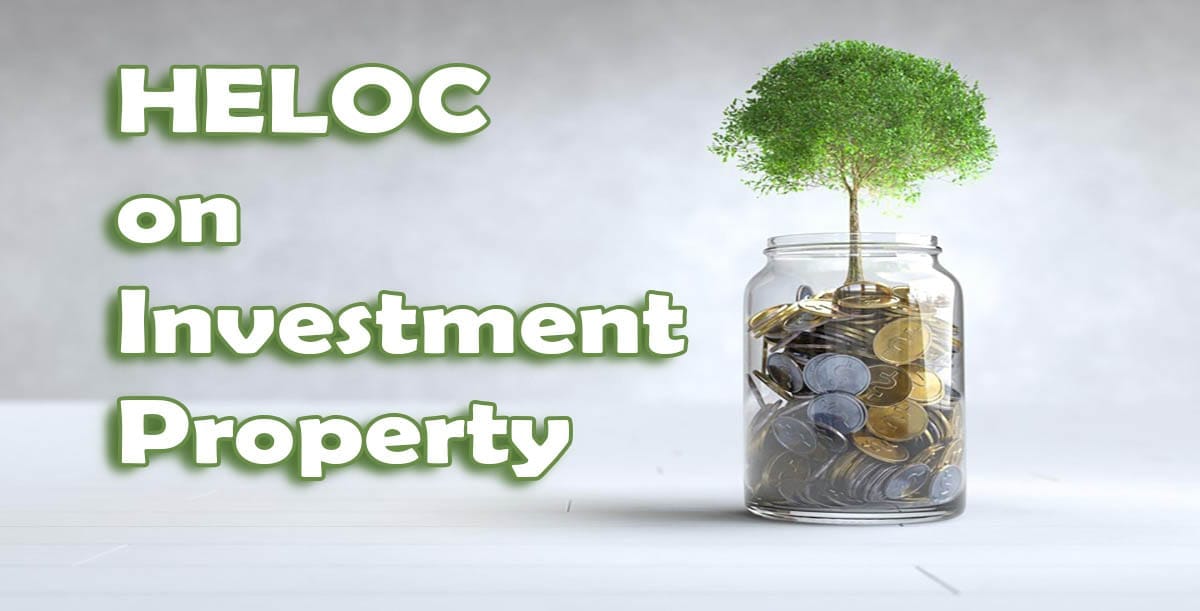Imagine unlocking a secret vault to access a treasure trove of investment capital without having to sell a single asset. Sounds like a fairy tale, right? Welcome to the world of Home Equity Lines of Credit (HELOCs) on investment properties. If you’re intrigued by the idea of leveraging your property’s equity to fund new ventures, this article is your golden ticket to understanding whether this financial strategy is a stroke of genius or a perilous plunge into the unknown.

Understanding HELOCs: What’s the Big Deal?
What is a HELOC and How Does It Work?
A Home Equity Line of Credit (HELOC) is a revolving credit line that allows homeowners to borrow against the equity in their property. It’s similar to a credit card, with your home serving as collateral. You can draw funds up to a certain limit, and as you repay, the credit line becomes available again. This flexibility can be a game-changer for accessing substantial sums for investment purposes without liquidating assets.
HELOC vs. Traditional Loan: Which is Better?
When compared to traditional loans, HELOCs offer several distinct advantages:
- Flexibility: HELOCs provide ongoing access to funds, unlike lump-sum traditional loans.
- Interest Rates: Often lower than traditional loans.
- Repayment Terms: More flexible.
However, HELOCs come with variable interest rates and the risk of depleting your property’s equity, which could be problematic if property values decline.
Investment Properties: A Quick Overview
What You Need to Know About Investment Properties
Investment properties are real estate purchased primarily to generate income through rental or appreciation. They can be classified as residential, commercial, or industrial. Understanding these types is essential before leveraging them with a HELOC.
The Financial Benefits of Real Estate Investment
Investing in real estate can be highly lucrative due to benefits such as:
- Steady Rental Income: Provides a reliable cash flow.
- Tax Deductions: Potential for significant savings.
- Property Appreciation: Increases in property value over time.
Using a HELOC can accelerate your investment strategy without tying up liquid assets.
The HELOC on Investment Property: Is It a Good Fit?
Advantages of Using a HELOC for Investment Properties
Utilizing a HELOC on an investment property can offer:
- Flexible Funding: For upgrades, acquisitions, or unexpected expenses.
- Cost-Effectiveness: Lower interest rates and potential tax benefits.
- Enhanced Cash Flow: By leveraging your existing property’s equity.
Potential Risks: What Could Go Wrong?
The risks include:
- Variable Interest Rates: Can lead to higher repayment costs if rates increase.
- Equity Risk: Borrowing against property equity can put your home at risk.
- Market Volatility: Property value declines could exacerbate financial risks.
Crunching the Numbers: Is It Worth the Risk?
Understanding HELOC Costs: Fees and Interest Rates
Hidden costs such as:
- Application Fees: Fees for processing the HELOC.
- Annual Fees: Recurring costs.
- Closing Costs: Upfront expenses.
Interest rates are variable and can impact overall costs. Conduct a thorough cost-benefit analysis to evaluate if the potential returns justify the expenses.
Estimating Potential Returns
Calculate potential returns by considering:
- Rental Income: Expected income from property rentals.
- Property Appreciation: Projected increase in property value.
- Tax Benefits: Possible deductions.
Include best-case and worst-case scenarios to prepare for financial outcomes.
Case Studies: Real-Life Examples
Success Stories: When HELOCs Made Investors Rich
Explore real-life examples of investors who used HELOCs to:
- Expand Portfolios: Grow their real estate investments.
- Renovate Properties: Increase property value and rental income.
- Seize Market Opportunities: Capitalize on favorable market conditions.
Cautionary Tales: When HELOCs Went Wrong
Learn from cases where HELOCs led to:
- Overextension: Excessive borrowing and financial strain.
- Market Misjudgment: Poor market timing and investment losses.
The Impact on Your Credit Score
How a HELOC Affects Your Credit Score
HELOCs can impact your credit score in several ways:
- Positive Impact: Timely payments can improve your score.
- Negative Impact: High credit utilization or missed payments can damage it.
Managing Your Credit with a HELOC
Maintain a healthy credit profile by:
- Monitoring Credit Utilization: Keep it low.
- Making Timely Payments: Avoid missed payments.
- Reviewing Credit Reports: Regularly check for accuracy.
Alternative Financing Options: Exploring Other Methods
Comparing HELOCs with Other Financing Options
Evaluate other methods such as:
- Home Equity Loans: Fixed interest rates and lump-sum payments.
- Personal Loans: Unsecured and faster access to funds.
- Cash-Out Refinancing: Potentially lower rates but involves refinancing your mortgage.
When to Consider Alternatives
Alternatives might be better if you:
- Prefer Fixed Rates: Home equity loans.
- Need Quick Funds: Personal loans.
- Want Lower Rates: Cash-out refinancing.
The Legal and Tax Implications
Understanding Tax Deductions
HELOCs might offer tax benefits if funds are used for property improvements. Consult a tax professional to understand:
- Deductible Interest: Potential for tax savings.
- Tax Rules: Changes and implications for deductions.
Legal Considerations
Review legal aspects such as:
- HELOC Agreement Terms: Understand your obligations.
- Default Implications: Risks of non-payment.
- Compliance with Laws: Adhere to real estate regulations.
Expert Opinions: Insights from Professionals
Advice from Real Estate Professionals
Gain insights into:
- Market Trends: Current conditions and future outlooks.
- Property Values: Understanding valuation and investment potential.
- HELOC Strategies: Effective use of HELOCs for growth.
Financial Advisor Recommendations
Financial advisors can help:
- Assess Financial Health: Evaluate overall strategy.
- Manage Risk: Balance debt and investment risks.
- Diversify Portfolio: Broaden investment opportunities.
Tips for Maximizing HELOC Benefits
Strategies for Effective Use
Maximize benefits by:
- Developing a Strategic Plan: Set clear goals and budgets.
- Prioritizing Investments: Focus on high-return opportunities.
- Ensuring Timely Repayment: Maintain a positive credit profile.
Common Mistakes to Avoid
Avoid:
- Over-Borrowing: Limit your debt.
- Neglecting Repayment: Stay on top of payments.
- Ignoring Interest Rate Fluctuations: Be prepared for changes.
Making the Decision: Is a HELOC Right for You?
Self-Assessment: Determine Fit
Assess if a HELOC aligns with your:
- Financial Situation: Evaluate stability and capacity.
- Investment Goals: Ensure it supports your objectives.
- Risk Tolerance: Understand your comfort with potential risks.
Final Thoughts: The Ultimate Verdict on HELOCs
In conclusion, a HELOC can be a powerful tool for leveraging your investment property’s equity, offering flexibility and potential financial gains. However, it also comes with risks that require careful consideration. Weigh the benefits against the risks and align the strategy with your financial goals to determine if a HELOC is the right choice for you.
Call to Action: Ready to Dive In? Here’s What to Do Next
If you’re considering leveraging a HELOC for your investment property, start by consulting with financial and real estate professionals. Develop a detailed plan, assess your financial health, and make sure you fully understand the implications. Take the plunge with confidence and make your investment dreams a reality!
Frequently Asked Questions (FAQs)
What is the monthly payment on a $50,000 HELOC?
The monthly payment on a $50,000 HELOC depends on several factors, including the interest rate, draw period, and repayment terms. Typically, during the draw period, you may only be required to make interest payments, which can vary based on the current interest rate. Once the draw period ends, you’ll start repaying both principal and interest, which will increase your monthly payments. Using a HELOC calculator or consulting with your lender can provide an estimate based on your specific terms.
What are the disadvantages of a HELOC?
HELOCs come with several potential disadvantages:
- Variable Interest Rates: Rates can fluctuate, leading to higher payments.
- Risk of Foreclosure: Your home is collateral, so failure to repay can result in foreclosure.
- Potential for Over-Borrowing: Easy access to funds might lead to excessive borrowing.
- Fees and Costs: There may be application, annual, or closing fees.
- Impact on Equity: Drawing from your home’s equity reduces your ownership stake.
Is a HELOC a trap?
A HELOC isn’t inherently a trap, but it can become problematic if not managed carefully. Risks include:
- Variable Rates: Rising interest rates can increase payments.
- Debt Accumulation: Easy access to funds might lead to over-borrowing.
- Home Equity Risk: Using too much equity can jeopardize your financial stability if property values decline or you face financial difficulties.
Can I convert my HELOC to a mortgage?
Yes, you can convert a HELOC to a mortgage through a process known as a “HELOC conversion” or “HELOC refinancing.” This involves refinancing the HELOC into a traditional mortgage with fixed terms. This can be beneficial if you want to lock in a fixed interest rate or consolidate debt, but it requires approval from your lender and might involve closing costs.
Can you pay off a HELOC early?
Yes, you can pay off a HELOC early. In fact, paying off your HELOC ahead of schedule can save you money on interest and reduce your debt faster. However, check with your lender for any prepayment penalties or conditions that might apply.
Is it wise to use HELOC?
Using a HELOC can be wise if you need flexible access to funds and manage the associated risks carefully. It’s suitable for financing investments, home improvements, or covering unexpected expenses. Ensure you have a clear plan for repayment and understand the risks, such as variable interest rates and potential impact on your home’s equity.
Is a HELOC harder to get than a refinance?
Obtaining a HELOC is generally less complex than refinancing a mortgage. HELOCs often have simpler application processes and quicker approvals, as they are based on your existing home equity rather than requiring a full mortgage application and appraisal. However, qualification criteria can vary by lender and your financial situation.
Are HELOC interest rates higher?
HELOC interest rates are typically variable and can be higher than fixed-rate mortgages but lower than some other types of loans. The rate depends on factors such as the lender’s terms, your credit score, and market conditions. It’s important to compare rates and terms with other financing options to determine the best fit for your needs.
How long does it take to get a HELOC?
The time to get a HELOC can vary but generally takes between 2 to 6 weeks. This timeframe includes application processing, credit checks, appraisal (if needed), and final approval. The speed can be influenced by the lender’s efficiency, your documentation, and current market conditions.
Does HELOC improve credit?
A HELOC can improve your credit score if managed responsibly. Making timely payments and maintaining a low credit utilization ratio can positively impact your credit rating. However, high balances or missed payments can negatively affect your score, so it’s essential to use and repay the HELOC wisely.
Can you get more money from a HELOC?
Yes, you can potentially get more money from a HELOC by increasing your credit limit or by opening multiple HELOCs if your equity allows. Your ability to borrow more depends on factors such as your home’s equity, your creditworthiness, and the lender’s policies.
What is the disadvantage of HELOC?
The primary disadvantages of a HELOC include:
- Variable Interest Rates: Can lead to unpredictable payment amounts.
- Risk of Foreclosure: Your home serves as collateral.
- Potential Fees: May include application, annual, or closing fees.
- Equity Reduction: Borrowing decreases the equity in your home.
- Debt Management Challenges: Easy access to funds might encourage over-borrowing.
How do I take advantage of a HELOC?
To take advantage of a HELOC:
- Assess Your Needs: Determine how much you need and how you will use the funds.
- Shop Around: Compare rates and terms from different lenders.
- Create a Repayment Plan: Develop a strategy to manage and repay the HELOC.
- Monitor Interest Rates: Stay aware of rate changes and adjust your payments accordingly.
- Use Funds Wisely: Invest in opportunities that provide a good return and avoid unnecessary borrowing.
How long is a draw period on a HELOC?
A typical draw period for a HELOC is 5 to 10 years. During this time, you can borrow and repay funds as needed. After the draw period ends, you enter the repayment period, where you must repay the principal and interest, often over a period of 10 to 20 years. The exact duration can vary by lender and specific HELOC terms.













